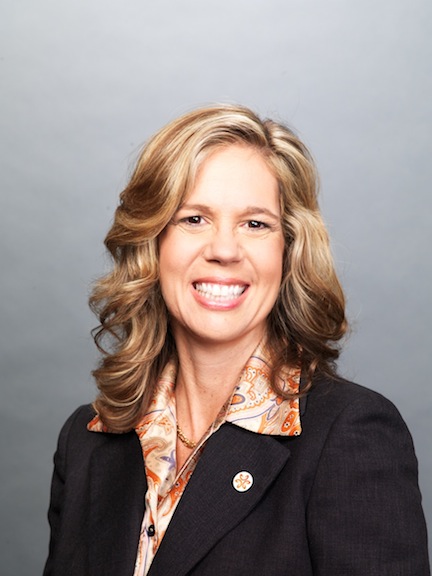In collaboration with CHIME, Becker's Hospital Review's "Life of a Healthcare CIO" series features leading hospital and health system CIOs from across the country who are sharing their experiences, best practices and challenges.
To recommend a CIO to be featured in this series, please contact Helen Gregg (hgregg@beckershealthcare.com).
An interview with Deanna Wise, executive vice president and CIO of Dignity Health in San Francisco. (Interview has been edited for length and clarity.)
Question: You've been CIO of Dignity Health since 2011 and have previously served in the CIO role at four other health systems. How has the role of the CIO changed during your career?
Deanna Wise: I would tell you that I don't think it has changed. I am and have been focused on three pillars: people, outcomes and customer service, and the circle around all those is relationships. I have the strong belief that without people, you can't get anything done. If you don't treat your employees with respect, they won't be empowered to get anything done. If you don't have a focus on customer service, [your customers] will abandon you, and if you don't have good outcomes, if you don't do what you say you will, you will fail.
Q: In your time with Dignity Health, what has been your biggest accomplishment?
DW: I won't say I'm done with this, but I'm striving really hard to create a culture where people have a voice and are empowered to do the right thing. It's the people closest to the front line who often have the ability to make the biggest impact and difference. When I started, people seemed resistant to share ideas; they thought they'd be blamed if it didn't go right. I want to create an environment where people take calculated risks and have the opportunity to raise their voice and concerns and make a difference.
Q: What do you see as your biggest misstep or mistake?
DW: I come from the Midwest, and I always had the belief that if my team and I do great things, people would recognize it, they'd just see it. The truth is, people tend to focus on the negative and don't always highlight the positive. You have to market your team — or, as I tell my team, yourself — and talk about the good things you're doing and bring awareness to them. If you don't tell your story, someone else will.
That's the reason I enjoy these types of conversations. It lets me give kudos where they're due: my team. Early in my career, I did not participate in these types of interviews, always thinking I should be focused on internal projects. I realized that was a disservice to my team.
Q: In the past month or so, what project has taken up the majority of your time?
DW: We have a "Hello humankindness" campaign, and it's talking about who we are as an organization. [Dignity Health President and CEO] Lloyd Dean conducted employee forums in each market, which was a great opportunity for me to go out with the leadership team and talk about what we're doing as a company and get feedback. We rented a big auditorium, it held about 2,500 employees, and people had the opportunity to ask questions. It was a great opportunity to engage with them and hear what they're thinking, and talk about what we're doing.
As I was reflecting back about this question, even though a lot of my focus has been on vendor contracts and enterprise data warehouses, what came to mind was the time spent engaging with employees.
Q: What is the biggest challenge you're facing right now?
DW: There are many CIOs retiring right now, which is surprising to me because I am super energized. This is a great time to be a CIO in healthcare. There's a lot to balance, because a CIO's job isn't just about deploying technology anymore; it's engaging with the business. Our core business is providing quality healthcare and putting the patient at the center of care while focusing on safety, but as we do this we're deploying technology and partnering with the business and the patient experience. So it's about looking for creative and innovative ways to do that. It is challenging to do so while also dealing with meaningful use, ICD-10 and the other big-headline topics.
Q: What is one lesson you've learned during your career that you'd like to share with other CIOs?
DW: One that I learned early in my career is a question I ask myself often and that I have my team ask themselves often: What is the right thing to do? If you keep that question in front of you at all times, you'll figure out the right answer.
The other thing is to build strong relationships. As we have more system deployments, there are a lot of things that can and will go wrong. If you have those relationships and people know you and are invested, you can overcome the challenges when things don't go right, because there will be those times.
More Articles in the “Life of a Healthcare CIO” Series:
The Life of a Healthcare CIO: Seattle Children's Wes Wright
The Life of a Healthcare CIO: Sanford Health's Arlyn Broekhuis
The Life of a Healthcare CIO: UPMC's Dan Drawbaugh

